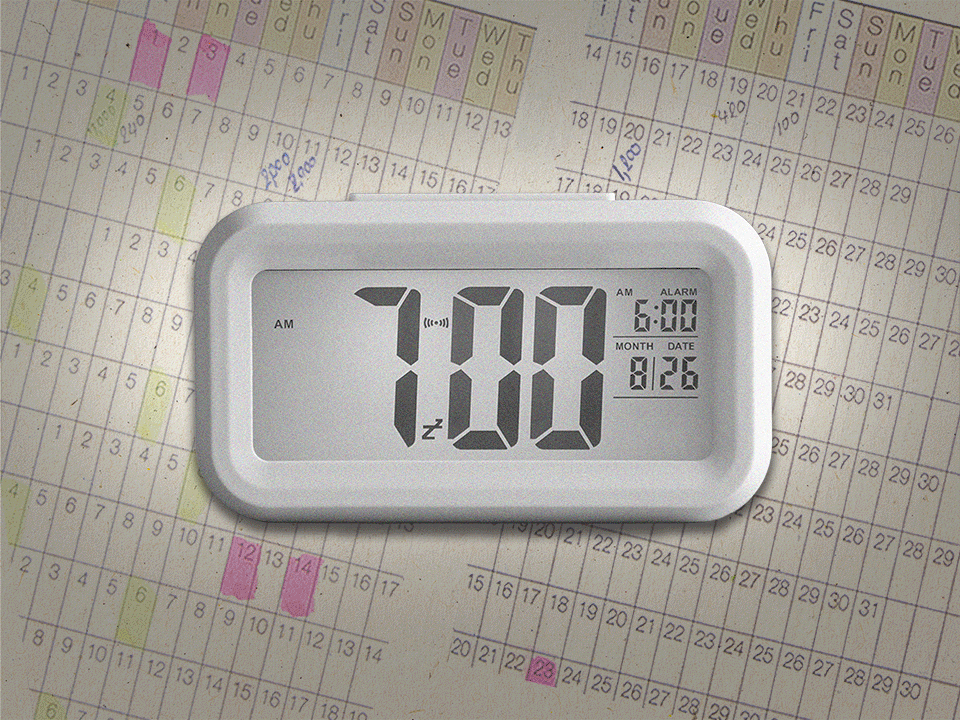15 Tips for Making a Routine You’ll Actually Stick To
Step one: Do it for you...not your social media. Additional reporting bySam Brodsky
You might know people who lift weights, make breakfast, work on their novel, and probably contemplate world domination all before sunrise. Or maybe you’ve seen the GRWM and “5 to 9 after my 9 to 5” videos on your social feed. Maybe you've spiraled (as one does) about how to create a routine of your own—and here we are!
While your regimen doesn’t have to be that intense, building a daily routine of any kind can help you meet your goals, stay organized, and stress less about making decisions, explains therapist Risa Williams, LMFT, author of Get Stuff Done Without the Stress and a professor at Pepperdine University. Plus, creating a routine can give you a sense of control that enables you to cope with chaos, says therapist Sachiko Tate, LCSW. Something you can relate to these days, perhaps?
If you want to learn how to build a routine, these therapist-backed tips will get you started.
1. Be your own motivation.
While those GRWM videos are weirdly satisfying, attempting to live your life like one is much less so. That’s because we can’t count on cheers, likes, or even envy from others to fuel our habits, says Williams. Instead, we need internal sources of motivation to fuel this new routine. Maybe you want to feel more in control of your day or less rushed before and after work. Those are the kinds of goals that can feed your self-esteem and confidence, she adds.
2. Set intentions you can crush.
The most important part of creating a routine is identifying the goals you want to work toward. Once you know that, it’ll be easier to pinpoint the habits that’ll get you there. And it’s never a bad thing to make those goals very realistic. Because if you feel like the outcome of your new habits is doable, it's easier to believe in yourself. Then, you may be more motivated to keep going, says psychotherapist Samantha Zhu, LMHC.
Another way to set the bar lower on this whole fresh routine thing (in a good way!) is by giving yourself a chill timeline to achieve your goals. Having ample time to adjust to new habits can help you begin and maintain an effective routine, says licensed psychologist David Tzall, PsyD. Let's say your goal is to develop an online presence across multiple social platforms so you can get your dream social media job. If you currently stink at posting regularly, don’t set out to hard-launch your new vibe within a month. Instead, focus your routine on posting more consistently to IG and build your content creation cadence from there. Then, you can progress to developing a routine that helps you post regularly on all platforms.
3. Create a feelings goal.
While goal-setting can look like listing out tangible achievements, like “I want to read the whole Dune series by the end of summer,” you can and should think about your emotional goals too, aka what feelings you hope to have more of by following this routine, Tate says. If you want to read more books because you feel like you should be reading more, then please see yourself back to step one. But if you want to get your Dune series on as a way to quiet your mind and feel more peaceful before bed, keeping that feeling goal in mind can help you stick with it when a Netflix binge is calling to you.
4. Write down your goals and how you’re going to reach them.
Routines serve as a roadmap for getting to your goals (what you want to do or feel), but if you don’t write down your goals and the routine you’ll use to accomplish it, you risk not following through. Zhu’s recommendation? Use a simple checklist or get creative with a calendar or another visual tool (like a bullet journal or habit tracker) to keep track of your habits. You might need to make lists and write things down several times in order to make them “stick” in your mind.
As for the emotional and tangible goals you’re working toward, keeping a journal to get honest about how it’s going can help you see how you’re progressing and if you’ve noticed an improvement.
5. Start with the bare minimum.
Even if you’re very motivated to feel less crazed in the mornings or to get some screenless downtime before bed, that doesn’t always seem important when your alarm goes off or Netflix queues up another episode. You can’t always count on your “why” to keep up with your new habits, which makes starting or restarting a routine hard, says Williams.
That’s when you can reach for the smallest, easiest task and begin building momentum. Williams calls this “activation energy.” It’s the “bare minimum amount of energy required to get you moving,” she explains.
Once you’ve gotten started by, say, getting up to brush your teeth instead of hitting snooze again, you’re more likely to keep going. You could also lay out your clothes and shoes for your run the night before or place an open book on your couch.
6. Give yourself options.
Having different strategies for accomplishing a goal can make it less intimidating. That’s why a “grab bag” of options is the way to go, says Williams. For example, say you’re writing a memoir. Amazing! But writing 1,000 words a day may not be realistic when you're low on energy. So, maybe you have a few lower-lift strategies to get you closer to your goal. That could be brainstorming the next chapter or looking at nostalgic photos. “As humans, we have to be flexible. Every day you wake up, your energy and focus are different. So you have to constantly be recalibrating,” Williams says.
7. Focus on your own progress.
Sorry to tell you, but comparing your progress to someone else’s will not help your routine, says Williams. Perhaps your goal is to read one book a month. Yay for you! Getting down on yourself for not keeping up with a BookTok-er who reads an entire series in a week will just make you feel like crap. How motivating is that?
Think of it this way: They’re doing them, and you’re doing you. Plus, you don't know their life or what they have to sacrifice to accomplish that goal. “Sometimes the people posting all that stuff are very stressed out, and they are one step away from burnout,” Williams notes. “You just don't see that."
8. Make the most of your free time.
One helpful way to create consistent, effective routines without going to bed before your fave comfort show airs or waking up at the crack of dawn is to fit new habits into open slots in your schedule, says licensed psychologist Jaci Lopez Witmer, PsyD.
If you’ve been wanting to spend more time with your friend down the street but can’t bring yourself to go out on a Friday night, see if you can squeeze in recurring walks with them on Sunday evenings after grocery shopping and before your weekly Sunday scaries pampering routine. Whatever your ideal situation might be, see where those new tasks fit most seamlessly into your schedule.
9. Focus on consistency.
This might shock you, but the actual tasks and timing associated with your new routine aren’t as big of a deal as the fact that you’re making goals and sticking with them, says Dr. Tzall. “Consistency is most important.”
So even if your ~rituals~ entail flossing your teeth before bed, tracking your sleep, and having a glass of water at noon every day, repeatedly returning to those (even if you miss a few days) can come with a sense of accomplishment, an elevated mood, confidence, and motivation. Keeping that in mind can also take the pressure off of feeling like you need to execute a complicated routine perfectly every single day, Tate explains.
Of course, staying consistent looks different for every person, Tate adds. So if planning out every hour of your day works for you long-term, cool! But if you need more flexibility and just want to commit to a 15-minute mental health walk once a week, that works too.
10. Lean on your people.
If you’re just starting out and are struggling to build consistency, consider tapping your community for help. “Telling another [person about] your routine or taking a person along can make you more accountable and give you motivation,” Dr. Tzall says. Just like you get up and go to work because someone expects you to be there (and your livelihood probably depends on it), having someone remind you why you started this new routine can make a huge difference. “Social influence can be a strong motivator,” he adds.
Having someone with you or on FaceTime while you’re on a walk, meal prepping, or organizing your closet is often referred to as body doubling, notes Williams. And it can 100% keep you accountable.
11. Don’t forget to be your own cheerleader.
Discipline does not mean punishing yourself when you slip up. It’s about showing up for yourself even when you don’t feel like it and your goal feels so far away, says Tate.
If you’re feeling discouraged about your progress, return to your journal or just think of how you wanted to feel by committing to these habits when you started. Revisiting your initial goals can encourage you to get back on track. You’re not always going to be excited to drink more water or go on that hike you had planned—and that’s OK! Reference how you want to feel instead of harping on the blah-ness you’re experiencing in the present moment, Tate says.
Celebrating small wins and having visual reminders of your “why” can also keep your morale up, notes Tate. Give yourself a mental or literal high-five for getting outside 10 minutes before it rained. Put encouraging messages on your mirror or set them as your phone’s background. Make a vision board. Whatever feels like you’re cheering yourself on!
12. Embrace a different type of reward.
One of the most feel-good motivators for sticking with a routine is rewarding yourself when you follow through. But while it’s important to celebrate your progress (whether it’s with a spa day, an extra 30 minutes of TV time, or a long shower), the external stuff is only helpful to a certain degree, Tate explains. The reward that sparks the most motivation (we’re sorry to report) is making progress toward your emotional and tangible goals. Yeah, it’s annoying news, but it is the truth. If you’ve been consistent with your routine, you’ll probably notice that you’re inching closer to those goals, whether it’s feeling calmer before bedtime or having more structure throughout your workday.
13. Keep it balanced.
When you’re laser-focused on your routine, it can be hard to stay flexible with your time and energy. In order to take care of our mental well-being and avoid burnout, you have to find a balance between structure and spontaneity with your time. “We need to have a little bit of both,” says licensed clinical social worker Julia López, PhD, MPH, LCSW. So even if you’re running with your pup three times a week or meditating for 20 minutes every morning, don’t forget to make a point to do unstructured chilling that has nothing to do with your goals or routine.
A routine should bring you a sense of calm, peace, and stability, so if it’s making you feel even more stressed or out of control, think about whether your plan is too strict or it’s just not exciting you anymore or if it’s really necessary to reach your goals, Tate suggests.
14. Be gentle with yourself.
When you deviate from your routine and struggle to tap into your discipline, have a little empathy for yourself. “We can often feel like failing to follow our routine equates to [personal] failure,” says Zhu. And if you consider yourself a big loser for missing a day or even a week, then you might just give up altogether, derailing your routine before you even get the consistency machine in motion. It’s completely fine to take a break, whether you meant to or not. If you feel like this routine is making a positive impact on your life, the important thing is to get after it again.
15. Adjust as needed.
As exciting and invigorating as it can feel to consistently stick to your routines, making space for adjustments can keep you from burning out. “If sticking with a routine is not effective or is too stressful, then you need to give yourself permission to say, ‘Let me try something else.’ Giving yourself grace to step back and evaluate how it is working for you is healthy for your mental well-being,” Dr. Tzall says.
If it’s hard for you to assess your feelings about your routine while you’re in the thick of it, you can hit pause for a few days or weeks, says Williams. Say you've been obsessively meal prepping on weekends. Take a breather this time around. If making lunches the night before or buying $20 salads stresses you out more, then you know what to do. Still, if dedicating your entire Sunday to feeding Future You really isn't working, try buying groceries and making lunches on different days. Or make less and supplement with a couple of overpriced salads every week. Be honest about what you need, and experiment to find what works best for you.
Wondermind does not provide medical advice, diagnosis, or treatment. Any information published on this website or by this brand is not intended as a replacement for medical advice. Always consult a qualified health or mental health professional with any questions or concerns about your mental health.




